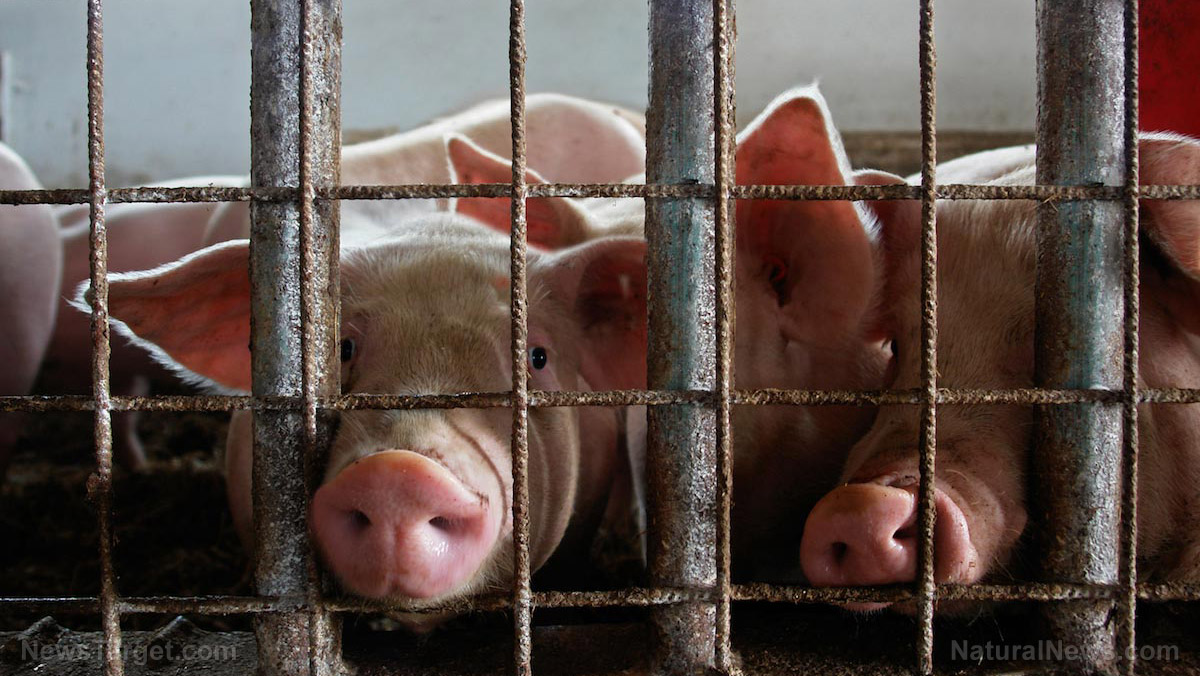 Parler
Parler Gab
Gab
New CRISPR cancer pigs on the way to your plate America – pig virus PRRS could evolve to bypass genetic resistance, potentially creating deadlier strains
The U.S. Food and Drug Administration (FDA) has approved the world’s first gene-edited pigs for human consumption, marking a pivotal moment in biotechnology and agriculture. Developed by British biotech company Genus, these CRISPR-modified pigs are immune to Porcine Reproductive and Respiratory Syndrome (PRRS), a costly disease plaguing industrial pig farming. While proponents argue this breakthrough could revolutionize food production, critics warn of potential health risks, ethical concerns, and a lack of consumer transparency. The approval raises urgent questions about the future of genetically altered meat — and whether the public is ready to accept it. PRRS has devastated pig farms since the 1980s, causing respiratory infections, high mortality rates in piglets, and annual losses exceeding $300 million in the U.S. alone. The virus thrives in crowded factory farms and mutates rapidly, rendering vaccines ineffective. Genus’s solution? Using CRISPR gene-editing technology to remove the cellular receptor that PRRS uses to infect pigs. The FDA’s greenlight means these genetically altered pigs can now reproduce, passing their edited traits to future generations — and their meat could reach U.S. supermarkets as early as next year. Unlike traditional genetic modification, which often introduces foreign DNA, CRISPR allows precise edits to an organism’s existing genes. However, the technology is not without risks. Past experiments have led to unintended mutations, such as enlarged tongues in pigs and extra vertebrae in cattle. Critics, including watchdog group GMWatch, warn that PRRS could evolve to bypass genetic resistance, potentially creating deadlier strains. “There is no silver bullet when it comes to PRRS,” cautioned a retired University of Minnesota veterinarian. Adding to the controversy is the lack of mandatory labeling. Genus’s chief operating officer, Matt Culbertson, told MIT Technology Review, “We aren’t aware of any labeling requirement,” meaning consumers may unknowingly eat gene-edited pork. Advocacy groups like the Center for Food Safety argue for stricter transparency, citing past failures like AquaBounty’s genetically engineered salmon, which faced market rejection due to consumer skepticism. These pigs join a short list of FDA-approved gene-edited animals, including GalSafe pigs (modified for allergy sufferers) and heat-tolerant cattle. The agency is investing heavily in agricultural gene editing, funding research into bird flu-resistant chickens and other livestock modifications. Yet, whether CRISPR-edited meat will gain public acceptance remains uncertain — especially without clear labeling. Consumers concerned about unlabeled gene-edited meat can seek certified organic products, support transparent local farmers, and advocate for labeling laws. As the global market weighs approval — with key players like China and the EU still undecided — the debate over CRISPR’s role in our food supply is far from over. One thing is clear: This approval sets a precedent, and its long-term consequences will shape the future of farming — and what ends up on our plates. Tune your food news frequency to FoodSupply.news and get updates on more toxic foods that are altered in a lab to make you sick and dying for Big Pharma profits. Sources for this article include: NaturalNews.com NaturalHealth365.comNew study links mRNA COVID-19 vaccines to increased risk of thyroid disease
By Belle Carter // Share
Soup as sauce: Creative ways to use tomato soup in pasta, pizza and casseroles
By HRS Editors // Share
The hidden toxins in rice: HEAVY METALS arsenic and cadmium detected in global food staple
By Ramon Tomey // Share
Social media fuels teen depression, study of 12,000 kids confirms
By Cassie B. // Share
Governments continue to obscure COVID-19 vaccine data amid rising concerns over excess deaths
By patricklewis // Share
Tech giant Microsoft backs EXTINCTION with its support of carbon capture programs
By ramontomeydw // Share
Germany to resume arms exports to Israel despite repeated ceasefire violations
By isabelle // Share










